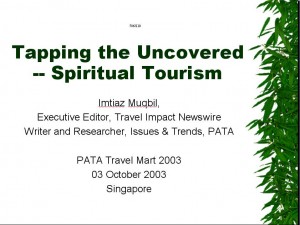
10 Apr, 2014
“Way of St James” heritage city in Spain to host 1st UNWTO Congress on Tourism & Pilgrimages
The First International Congress on Tourism and Pilgrimages is to be held between 18 – 20 September 2014 in Santiago de Compostela, Spain. It is co-organised by the UN World Tourism Organisation, the Spanish Secretariat for Tourism and the Regional Government of Galicia.
The capital of the autonomous community of Galicia in northwestern Spain, Santiago de Compostela has its origin in the shrine of Saint James the Great, now the city’s cathedral, as a destination of the Way of St. James, a leading Catholic pilgrimage route originated in the 9th century, according to Wikipedia. In 1985 the city’s Old Town was designated a UNESCO World Heritage Site.
Reports UNESCO, “From the shores of the North Sea and the Baltic Sea thousands of pilgrims carrying the scallop shell and the pilgrim’s staff for centuries walked to the Galician sanctuary along the paths of Santiago, veritable roads of faith. Around its cathedral, a masterpiece of Romanesque art, Santiago de Compostela conserves a valuable historic centre worthy of one of Christianity’s greatest holy cities.”
The UNWTO conference is aimed at:
- Highlighting the importance for tourism of the historical and cultural legacy of pilgrimages and spiritual routes, focusing on both their religious and secular aspects;
- Discussing the role of tourism policies and strategies in the preservation and management of heritage assets along paths and routes, and thus,
- Underlining the positive contribution of pilgrimages to the sustainable and responsible growth of tourism as well as the contribution of tourism towards international understanding.
This is the tentative programme:
Thursday 18 September
Session 1: Pilgrimages as a driver of tourism and hospitality
Sacred places embody universal values. Pilgrimage of believers belonging to diverse faiths can boost international tourism and, consequently, local development as it has been shown in recent decades.
Session 2: Popular religious practices, pilgrimage and spiritual tourism
Participation in popular devotions and the search for personal fulfilment are universal motivations for pilgrimages and spiritual tourism. This session will showcase the perspective of pilgrimage centres in identifying the different motivational factors that generate the demand.
Monographic session: Franciscanism and pilgrimage
2014 is the year of the eighth centenary of the Pilgrimage of St. Francis of Assisi to Santiago de Compostela. This monographic session will present four centres of pilgrimage linked to the memory of St. Francis: Jerusalem, where Franciscans have played a prominent role since the founding of the Franciscan Order; Assisi, where the relics of the saint rest; Varallo, where for the first time the evocation of Jerusalem was created by the Franciscans in Europe; and the California Mission trail.
Friday, 19 September:
Session 3: Pilgrimage tourism and historical and cultural heritage
Tourists and pilgrims are attracted by the historical and cultural legacy present in pilgrimage routes and sacred sites. Places of worship and shrines draw increasing numbers of people, not only the religious, enhancing the role of tourism in the preservation of historical heritage and cultural identity in the age of globalization.
Session 4: Nature as inspiration for tourism and pilgrimage
Respect for the environment must be closely connected to the practice of pilgrimage tourism in paths and routes. The paths used in the past by local people and pilgrims, and now also by numerous tourists, cross a wide range of natural spaces; which often constitute cultural landscapes that are rich in spiritual and symbolic values.
Session 5: Sustainability of pilgrimage tourism
Tourism and pilgrimage represent increasingly complex human activities that depend directly on finding the balance between traditions and the needs of both hosts and visitors. Pilgrimage routes and sacred sites entail multiple challenges in terms of policy, development strategy, resource management, carrying capacity and heritage preservation. This session analyses strategies and steps in developing and marketing pilgrimage tourism products.
Presentation of case studies: Technical presentations on challenges relative to management, visitation and carrying capacity, preservation, seasonality, marketing and promotion.
Technical debate
Reading of the Declaration of Santiago and Closing Ceremony
Saturday, 20 September: Social programme and technical visits




Liked this article? Share it!